- Contents
In an ever more digitalized world, technology plays a significant role in streamlining various aspects of our daily lives. Finding love has also taken a digital turn with the advent of dating apps. These platforms have transformed how we connect, making meeting potential partners and exploring romantic possibilities easier.
According to, EarthWeb, 270 million people use dating apps worldwide and men are using online dating sites and apps more than women. Men account for 52.4% of the online dating market, while women make up 47.6%.
To understand how people around Africa think about dating apps, GeoPoll surveyed– Ghana, Kenya, and Uganda– in November 2023 with a sample size of 4,259 participants. This delves into the world of dating apps, offering insights and data that shed light on the current landscape of digital dating.
This report highlights key aspects, including:
- Popularity of dating apps
- What motivates people to use dating apps
- Most popular dating apps
- Important features of dating apps
- Relationships and dating apps
- Dating apps safety and privacy
Popularity of Dating Apps
Over the past decade, dating apps have become integral to modern romance. Our survey findings show that a significant 97.37% of the respondents have used dating apps, while a smaller 2.63% have not. This data highlights the widespread adoption of dating apps, emphasizing their role in shaping how people approach relationships in today’s digital era.
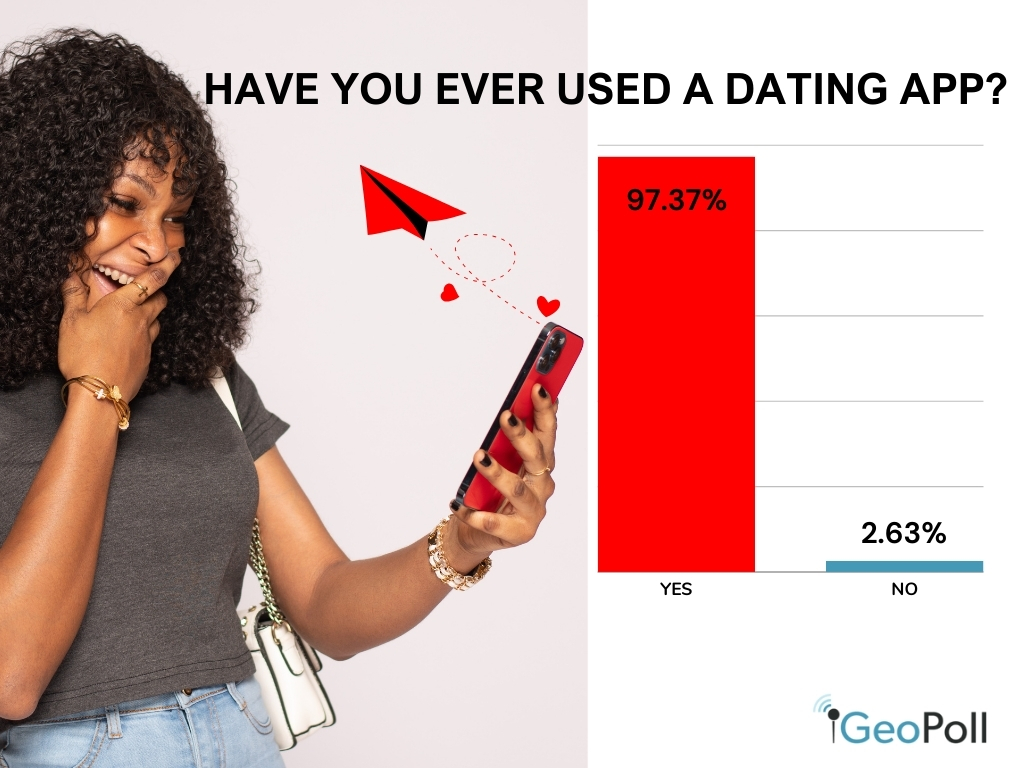
Demographics and Preferences:
Dating apps appeal to a broad demographic, with users spanning various age groups, backgrounds, and interests. Our data suggests that the most significant demographic using dating apps falls within the 25 to 34 age range, but the platforms cater to individuals of all ages.
Preferences also vary widely, with 30.59% of users seeking romantic encounters while 32.30% are pursuing long-term relationships. A vast majority of 36.82% use the apps to make platonic friends. The diversity of dating app offerings, from those geared towards specific communities to those emphasizing compatibility algorithms, ensures that users can find platforms aligning with their unique needs.
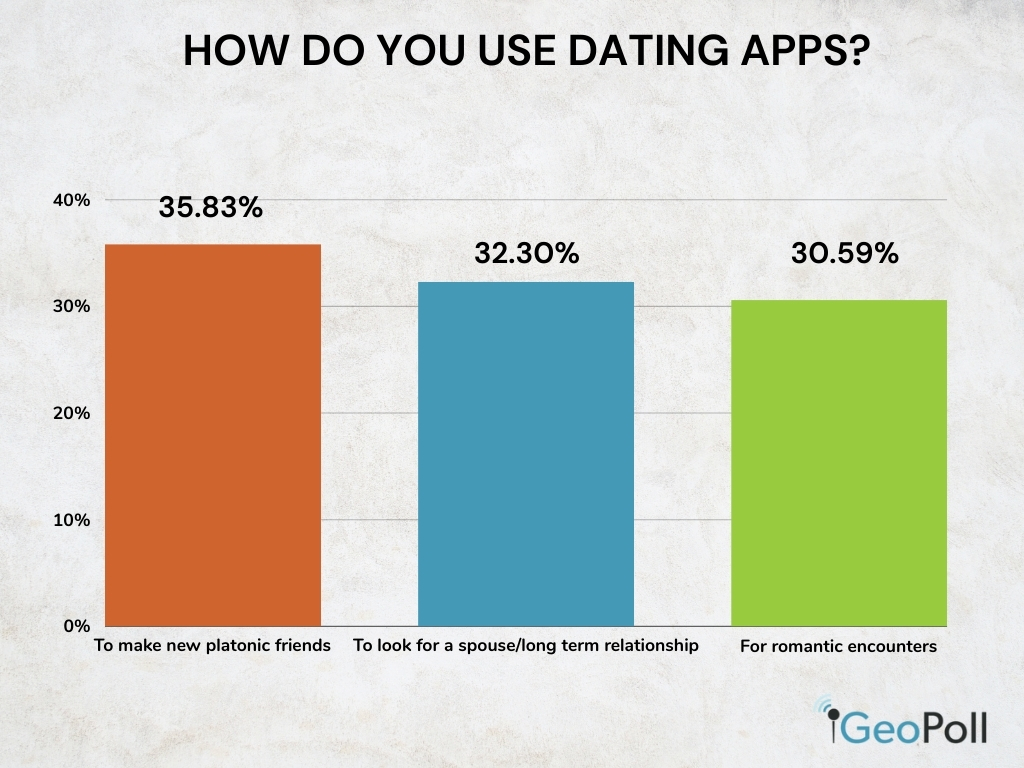
What motivates people to use dating apps
So, our study spills the beans on why folks dive into dating apps, and it’s a mixed bag! A good chunk, about 32.93%, is all about making new buddies. Right behind them at 27.66%, we’ve got the serious relationship seekers. Then, there’s the 19.77% crew, using the app for some romantic vibes, and a curious bunch at 19.21%.
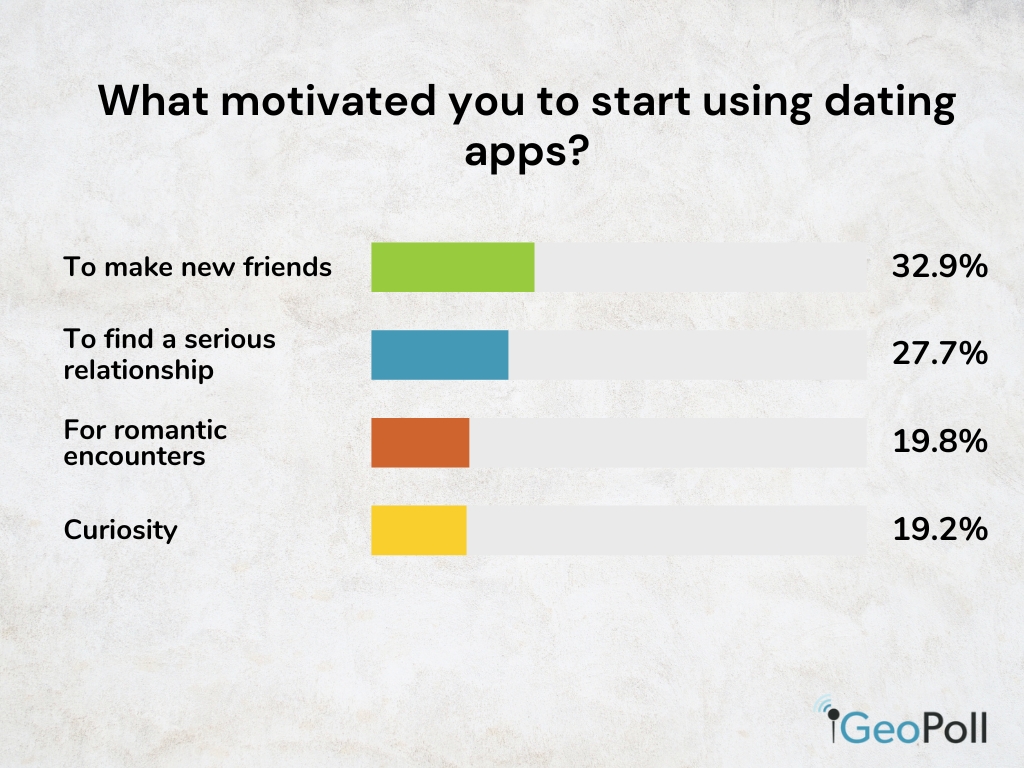
Now, let’s talk Uganda! Things take a twist there. A whopping 36.70% are on the app for the real deal – they’re searching for a spouse or long-term love. Close runners-up at 36.48% are in it to make new new pals, and 25.57% are in the game for some romantic encounters.
Most Popular Dating App
According to Statista.com, Tinder is the most downloaded dating application in the world. First released in April 2012, the American company introduced the swiping model, with people anonymously indicating who they are interested in. Once two individuals are a “match”, they can text and initiate a date.
Litmatch and Bumble ranked second and third, with over 3.4 million and close to 2.7 million monthly downloads respectively.
The GeoPoll’s survey findings indicate a rather similar trend in Africa as shown below:
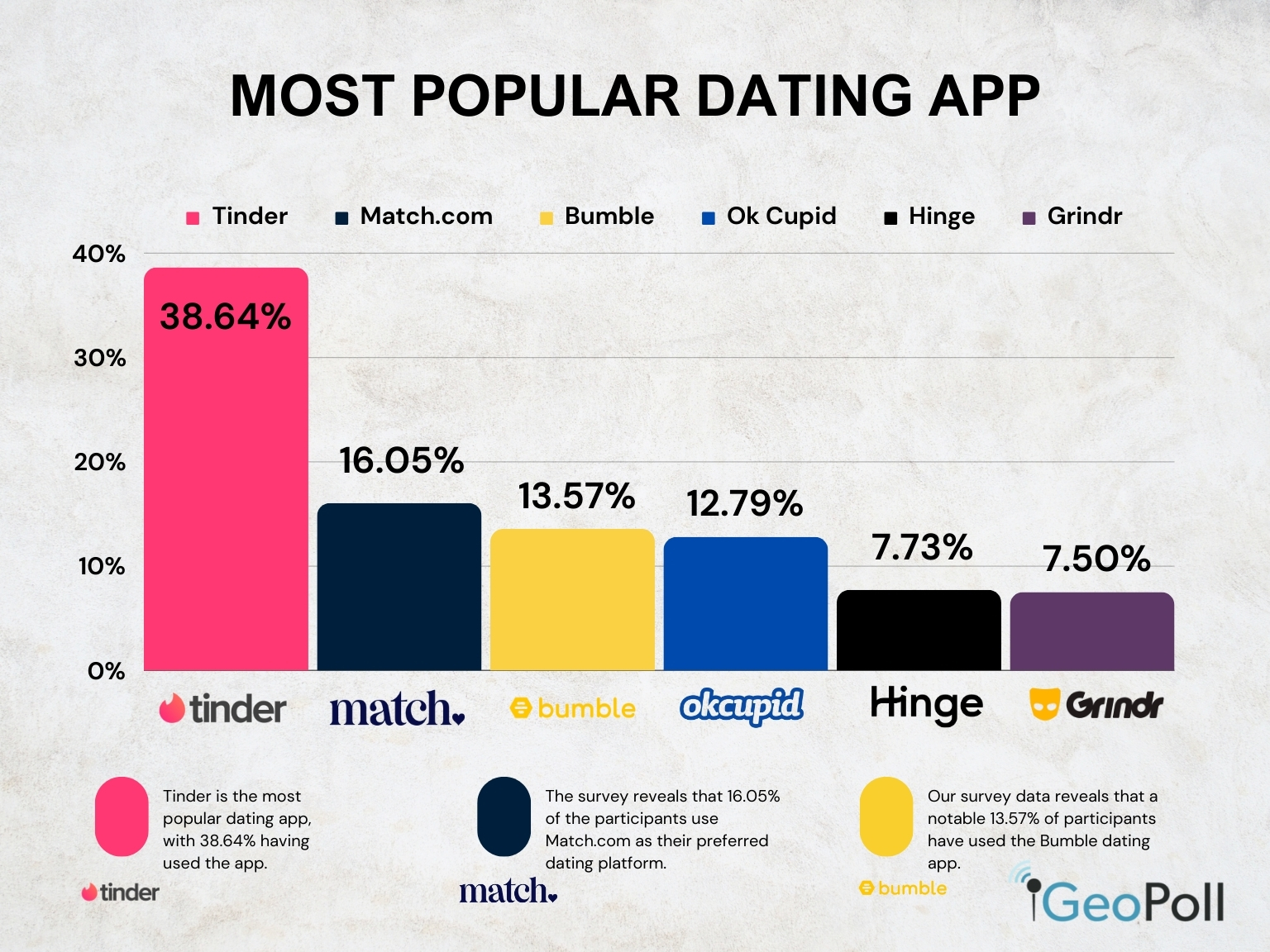
1. Tinder
Tinder is a mega-star dating app for young people. The data shows that this app has been downloaded over 530 million times, with 75 million monthly active users and 9.6 million subscribers in 2021.
Data from the survey reveals that Tinder is the most popular dating app, with 38.64% having used the app.
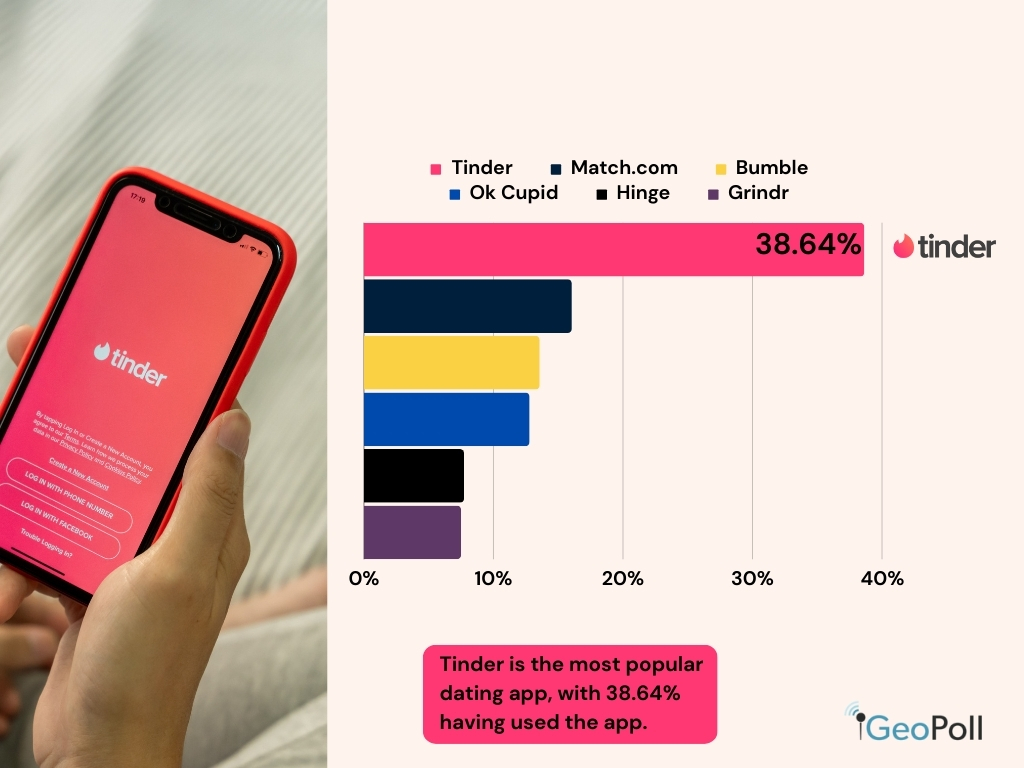
2. Match.com
This is one of the oldest dating platforms, launched in 1995. It has become one of the most well-known and widely used dating platforms globally. The survey reveals that 16.05% of the participants use Match.com as their preferred dating platform.
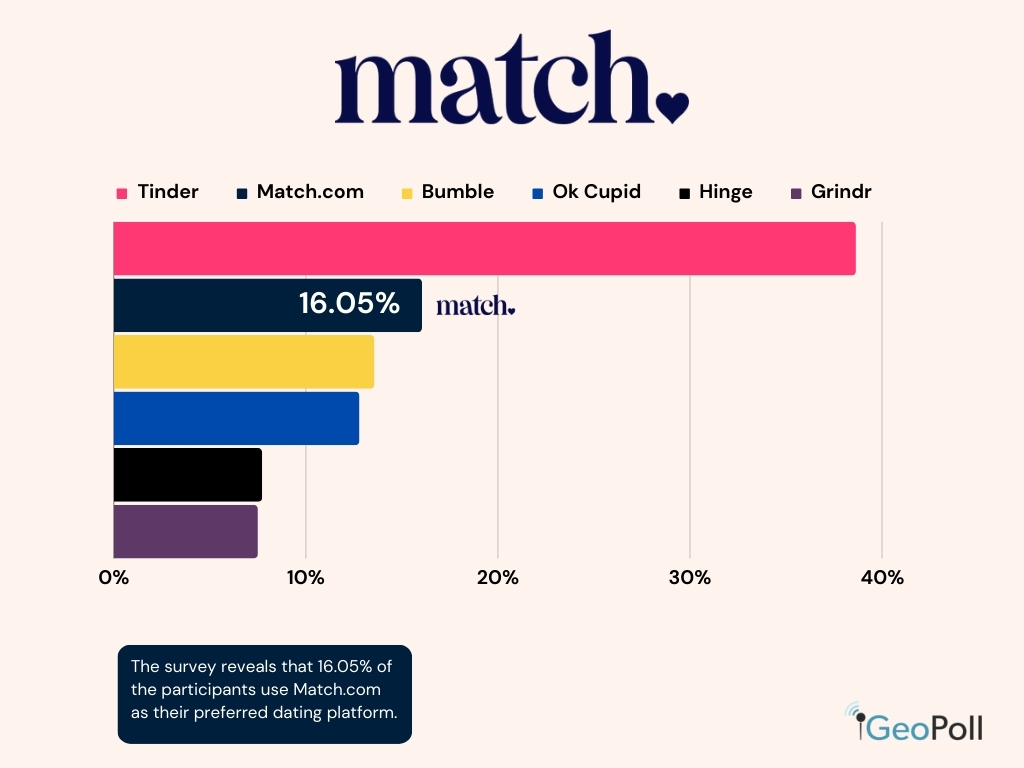
3. Bumble
According to Dating Advice, Bumble was founded in 2014 by Whitney Wolfe Herd (who co-founded Tinder) with the help of Badoo CEO Andrey Andreev and former Tinder employees Chris Gulczynski and Sarah Mick. To make a more female-driven dating app. It has over 50 million downloads worldwide and is available in 150 countries.
Our survey data reveals that a notable 13.57% of participants have used the Bumble dating app.
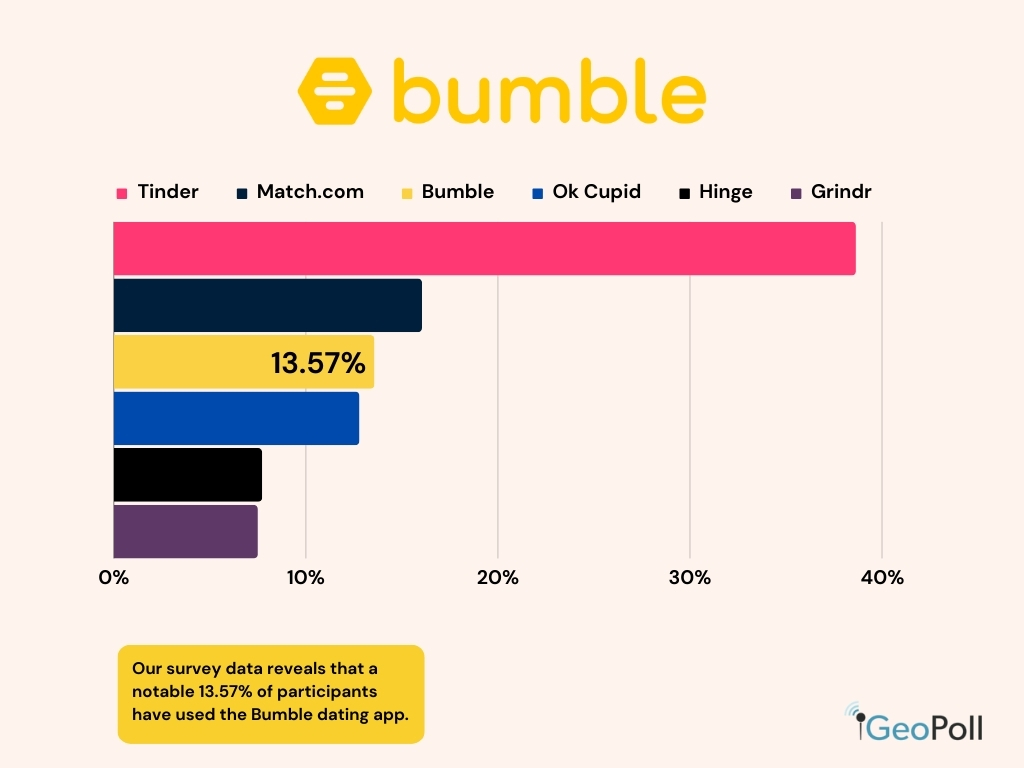
4. OkCupid
Forbes recently described OkCupid as an inclusive dating website with a comprehensive free plan and unique matching algorithm. It’s loaded with plenty of special free and paid features, like an in-depth questionnaire that connects you to others with similar interests and beliefs.
The recent study also reveals OkCupid’s popularity in Africa, with 12.79% of the respondents agreeing to use the platform.
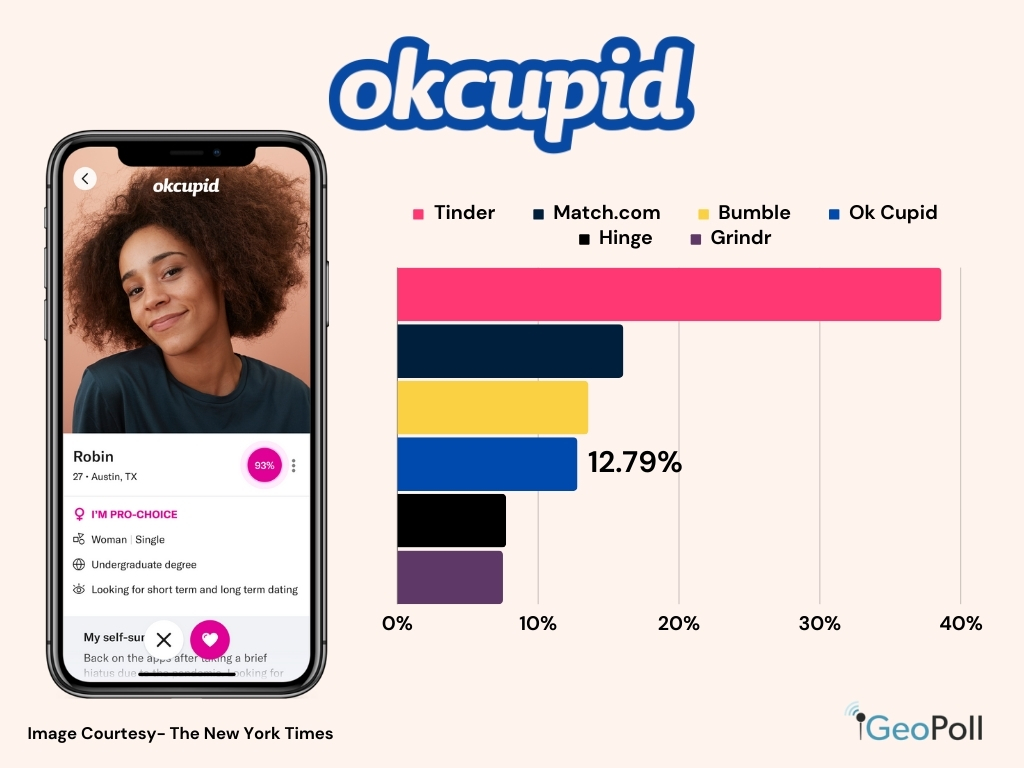
5. Hinge
Describing itself as ‘The Dating App Designed to be deleted,’ Hinge is popularly known for aiming to build long-term relationships instead of quick hookups. Our data suggests that 7.73% have used Hinge as their go-to dating platform.
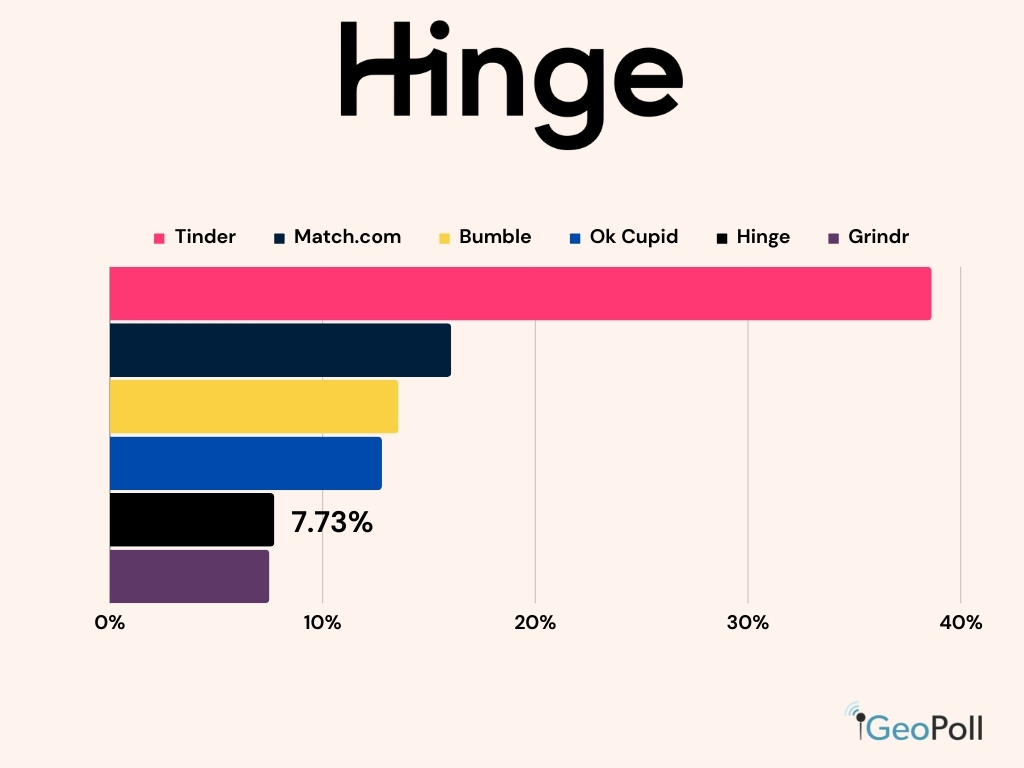
Impact on Traditional Dating:
The rise of dating apps has undoubtedly influenced traditional dating norms. From the initial stages of getting to know someone to the dynamics of defining a relationship, the digital realm has introduced a new domain. Despite these changes, many argue that the core elements of building a connection and fostering romance remain unchanged.
Our study revealed that 42.59% of the respondents would prefer to use both dating apps and traditional means of dating. A substantial 35.53% prefer using dating apps as opposed to conventional ways, and 21.89% prefer old-school courtship.
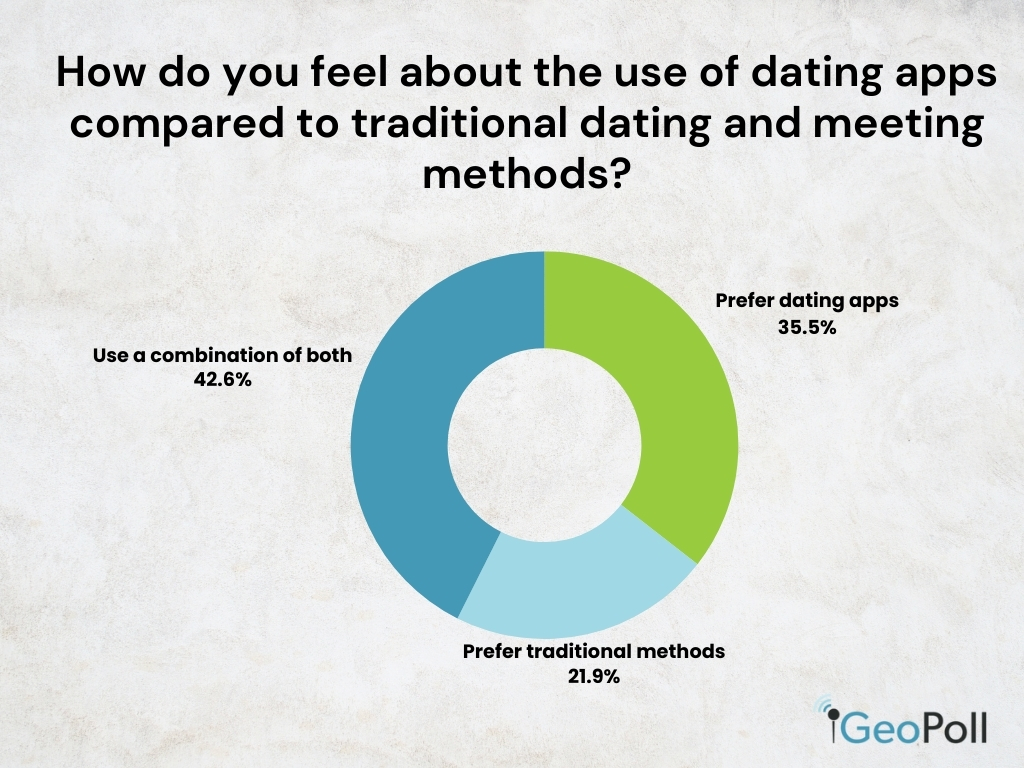
Essential features of dating apps
What sets certain apps apart and captures users’ preferences? Our study uncovers critical factors, with a significant 28.47% prioritizing user profiles and photos. Close behind, 22.23% favor messaging and chatting features, while 17.36% appreciate practical matching algorithms. The location-based matching feature follows closely at 16.33% and 15.47% value profile verification and safety features. These insights shed light on the distinctive aspects that draw individuals towards specific dating apps.
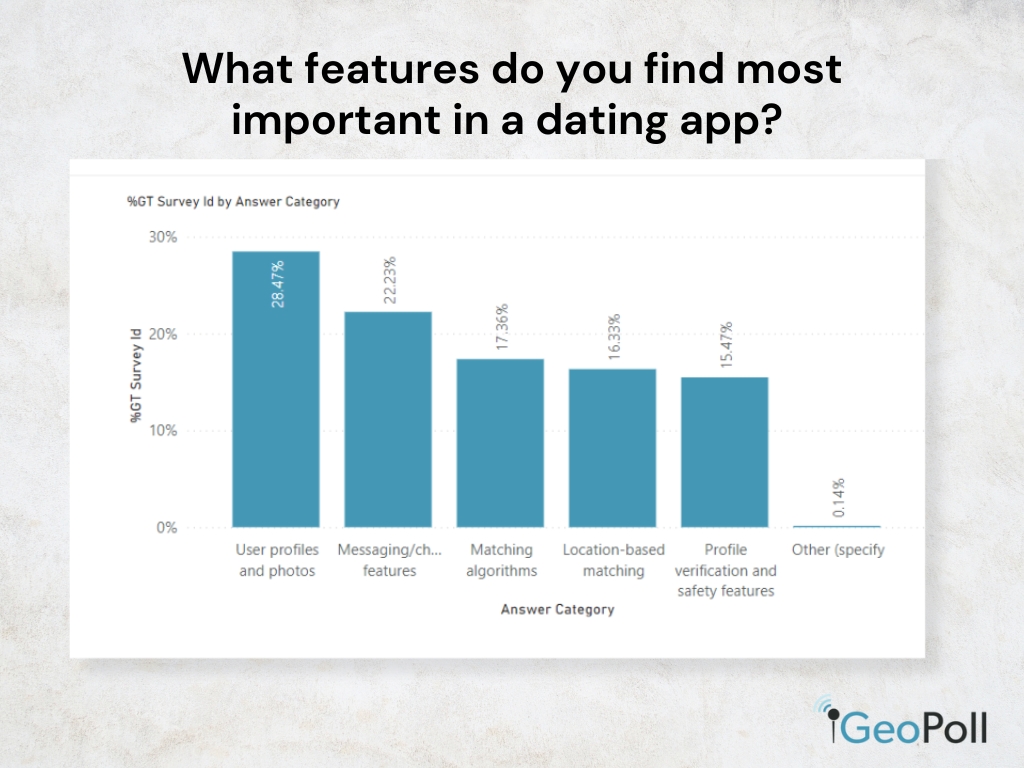
People actually meet
In the survey, GeoPoll asked whether they had met someone from a dating app. The results revealed that 70.32% of respondents had met someone through dating apps, while 29.68% reported not having had such an encounter.
Furthermore, respondents were queried about initiating meaningful relationships that originated from dating apps. The findings indicated that 58.02% responded affirmatively, acknowledging the commencement of a significant relationship through a dating app, while 41.98% reported not doing so.
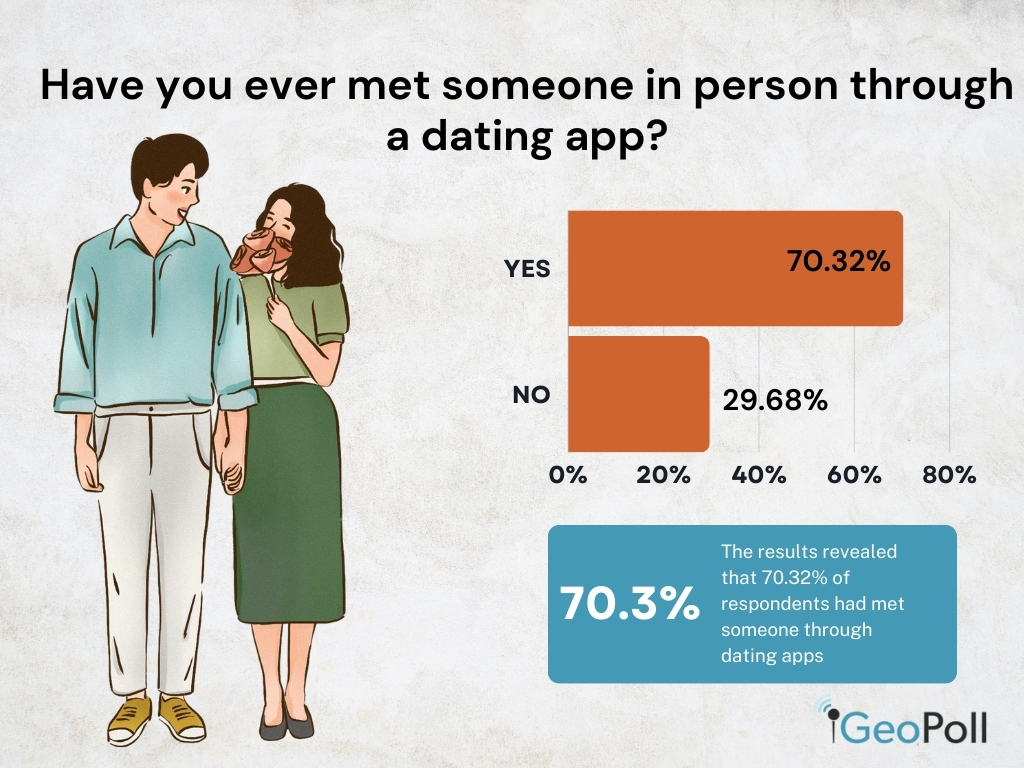
Safety and Privacy
Safety concerns regarding meeting individuals online have prompted certain dating apps to implement safety measures within their platforms. When participants were questioned about their assessment of safety and privacy during app use, 33.71% expressed feeling somewhat safe, 30.10% considered their experience very safe, 26.83% remained neutral, 7.91% felt unsafe, and 1.38% perceived their interactions as very dangerous.
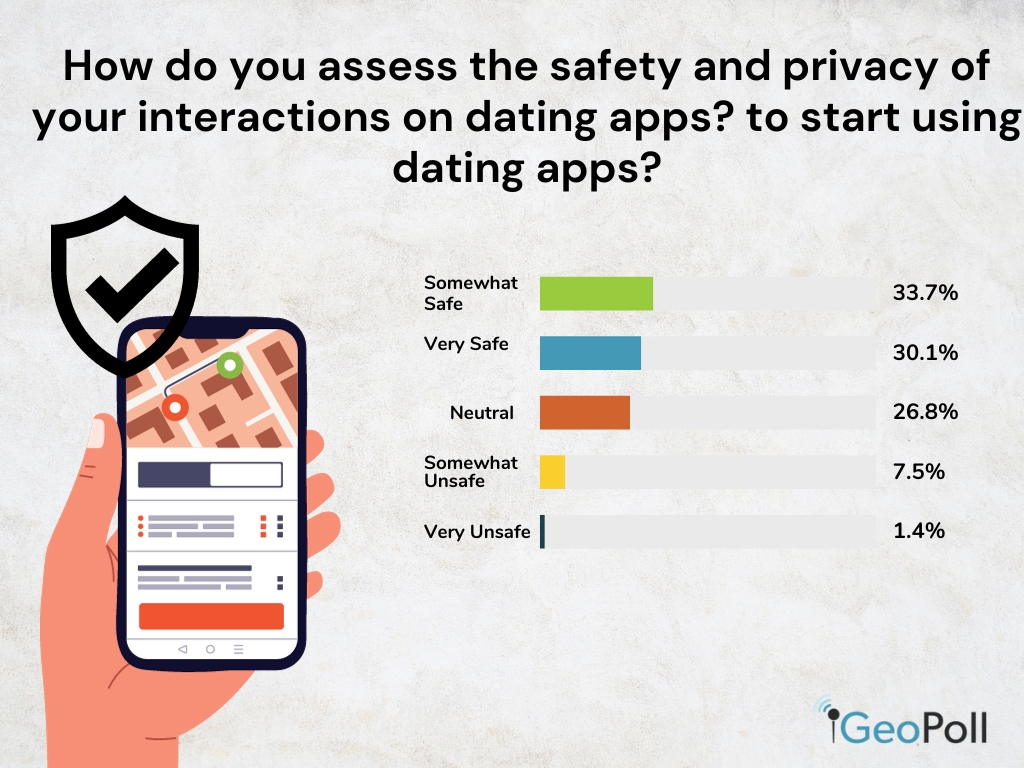
As technology advances, the future of dating apps holds exciting possibilities. Features like virtual reality dating experiences and enhanced security measures will likely shape the next generation of digital dating. The evolving landscape prompts us to consider how these changes will impact our approach to love and relationships.
Methodology/About this Survey
This Exclusive Survey was run via the GeoPoll mobile application in November 2023 in Ghana, Kenya and Uganda. The sample size was 4,259, composed of random app users between 18 and 60. Since the survey was randomly distributed, the results are slightly skewed towards younger respondents.
Please get in touch with us to get more details about exclusive GeoPoll surveys, conduct a scientific study of dating apps, or other topics in Africa, Asia, and Latin America.
